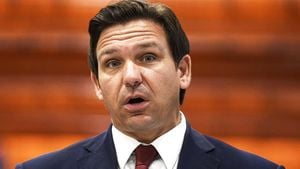The financial backdrop is getting intense as Scotland's political parties navigate the turbulent waters of budget negotiations. Leading the charge are the Scottish National Party (SNP) and the Liberal Democrats, both aiming for some groundwork on the fiscal plans for the upcoming year. The Scottish Liberal Democrat leader, Alex Cole-Hamilton, recently made headlines by declaring his party is "still some considerable distance" from reaching any deal with the minority SNP Government. This statement encapsulates the heightened tension and negotiations stemming from the upcoming budget.
During recent discussions, which were meant to outline potential budgets for 2025-26, Cole-Hamilton acknowledged movement had occurred but emphasized it wasn't enough to bridge the considerable gap remaining. "They're going to have to move some mountains if they want the Lib Dems to vote for these," he remarked, summing up the stakes involved as the pressure mounts.
First Minister John Swinney, who also leads the SNP, assembled his cabinet alongside various party members, calling on other political factions within Holyrood to approach the budget with good intentions. Swinney’s message was clear: collaboration is key. He intends to set the stage for constructive dialogue when Finance Secretary Shona Robison unveils the draft spending and tax plans.
This draft budget is particularly important, as the SNP currently operates as a minority administration. Without cross-party support, the budget risks being blocked. Swinney, when questioned about the possibility of calling early elections should opposition parties reject his plans, stressed they’re entering negotiations with sincerity. Hard work on the budget was described as the product of extensive discussions with not only political parties but also local authorities, businesses, and stakeholders.
Following the closure of talks on Tuesday, Cole-Hamilton reminded reporters there’s still significant negotiating ground to cover: “It is fair to say there is still some considerable distance to travel,” he stated. The message is clear: the Liberal Democrats are demanding improvements to council funding and increased access to local healthcare, not to mention enhancements to social care. He firmly expressed his belief this budget should steer clear of any financial support directed toward independence, urging fellow leaders to focus on the urgent matters at hand rather than revisiting past debates.
Yet, as negotiations continue, other parties like the Scottish Greens have indicated their own priorities. They align quite closely with the Lib Dems but maintain distinct “red lines,” particularly emphasizing the need for climate project funding and additional financial support for local councils.
Meanwhile, the Scottish Conservatives have weighed in, demanding the SNP government reverse the recent tax hikes, with finance spokesperson Craig Hoy urging the ruling party to demonstrate “some common sense” amid these challenging discussions. It appears every party is wrestling for position, each creating additional demands likely complicates what is already perceived as a tricky negotiation environment.
On another front, the Liberal Democrats have indicated they’re pushing for certain infrastructure projects to be included within budget discussions. Residents of Newburgh, Fife, have been pressing for the return of their train station for decades. Local campaigners have articulated their frustrations over stalled commitments from the government, marking the infrastructure need as urgent and necessary.
The Lib Dems argue having this train station included as part of the budget would significantly uplift the community and respond to long-standing demands for improved transport links. Local campaigner Nigel Mullan stated, “It’s something which could have transformative potential locally.”
Focusing back on the budget, some estimates suggest bringing the train station project to completion could soar as high as £8 million, though advocates argue it could be enacted for less than £1 million by opting for simpler, modular installations.
While some parties signal readiness to negotiate, they’re also gearing up for potential fallout. With the backdrop of expectations, it remains to be seen whether they secure the necessary cooperation to pass the budget successfully. Every passing day brings more uncertainty, as each party's directives are laid bare. With the draft budget scheduled for release soon, political analysts and the populace alike watch with bated breath.
Overall, this situation underlines the fragile nature of the Scottish government's current position. The coming weeks will pivot not only on the budget itself but also on the strength of collaboration, accountability, and the capability to address pressing needs across Scottish communities. Will they rise to the occasion, or will they fall prey to political squabbles? Only time will tell as key players maneuver through this politically charged budget negotiation saga.



